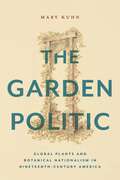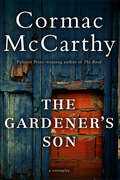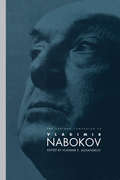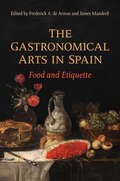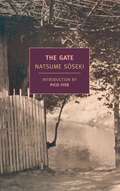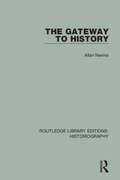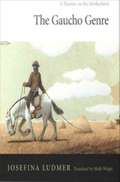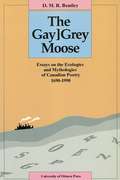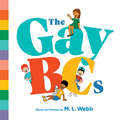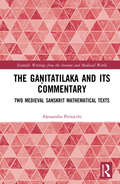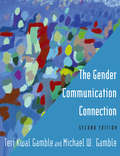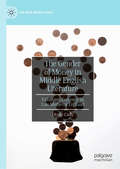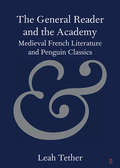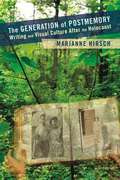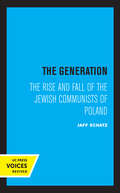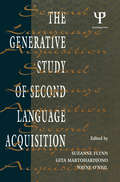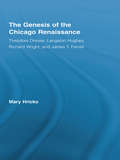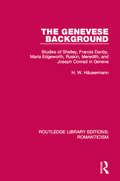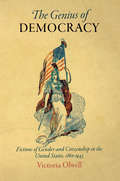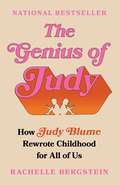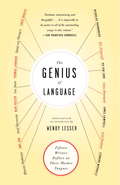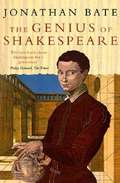- Table View
- List View
The Garden Politic: Global Plants and Botanical Nationalism in Nineteenth-Century America (America and the Long 19th Century #27)
by Mary KuhnHow worldwide plant circulation and new botanical ideas enabled Americans to radically re-envision politics and societyThe Garden Politic argues that botanical practices and discourses helped nineteenth-century Americans engage pressing questions of race, gender, settler colonialism, and liberal subjectivity. In the early republic, ideas of biotic distinctiveness helped fuel narratives of American exceptionalism. By the nineteenth century, however, these ideas and narratives were unsettled by the unprecedented scale at which the United States and European empires prospected for valuable plants and exchanged them across the globe. Drawing on ecocriticism, New Materialism, environmental history, and the history of science—and crossing disciplinary and national boundaries—The Garden Politic shows how new ideas about cultivation and plant life could be mobilized to divergent political and social ends. Reading the work of influential nineteenth-century authors from a botanical perspective, Mary Kuhn recovers how domestic political issues were entangled with the global circulation and science of plants. The diversity of Harriet Beecher Stowe’s own gardens contributed to the evolution of her racial politics and abolitionist strategies. Nathaniel Hawthorne’s struggles in his garden inspired him to write stories in which plants defy human efforts to impose order. Radical scientific ideas about plant intelligence and sociality prompted Emily Dickinson to imagine a human polity that embraces kinship with the natural world. Yet other writers, including Frederick Douglass, cautioned that the most prominent political context for plants remained plantation slavery. The Garden Politic reveals how the nineteenth century’s extractive political economy of plants contains both the roots of our contemporary environmental crisis and the seeds of alternative political visions.
The Gardener's Son: A Screenplay
by Cormac McCarthyThe first screenplay by the Pulitzer Prize–winning author of The Road tells the saga of rival families in post-Civil War South Carolina.Set in Graniteville, South Carolina, The Gardener’s Son is a tale of privilege and hardship, animosity and vengeance. The McEvoys, a poor family beset by misfortune, must work in the cotton mill owned by the Greggs. But when Robert McEvoy loses his leg in an accident—rumored to have been caused by his nemesis, James Gregg—the bitter young man deserts his job and family.Two years later, Robert returns. His mother is dying, and his father, the mill’s gardener, is confined indoors working the factory line. These intertwined events stoke the slow burning rage McEvoy has long carried, a fury that erupts in a terrible act of violence that ultimately consumes the Gregg family and his own.Made into an acclaimed film broadcast on PBS in 1976, The Gardener’s Son received two Emmy Award nominations and was screened at the Berlin and Edinburgh Film Festivals.
The Gargantuan Polity
by Michael RandallCritics and scholars have long argued that the Renaissance was the period that gave rise to the modern individual. The Gargantuan Polity examines political, legal, theological, and literary texts in the late Middle Ages, to show how individuals were defined by contracts of mutual obligation, which allowed rulers to hold power due to approval of their subjects. Noting how the relationship between rulers and individuals changed with the rise of absolute monarchy, Michael Randall provides significant insight into Renaissance culture and politics by showing how individuals went from being understood in terms of their objective relations with the community to subjective beings. By studying this evolution, he challenges the argument that subjectivity enabled modern political autonomy to come into existence, and instead argues that subjectivity might have disempowered the outwardly directed and highly political individuals of the late Middle Ages. A profound and detailed study of one of the most drastic periods of change, The Gargantuan Polity will be of interest to scholars of French literature, the Renaissance, and intellectual history.
The Garland Companion to Vladimir Nabokov
by Vladimir E. AlexandrovFirst published in 1995. Routledge is an imprint of Taylor & Francis, an informa company.
The Gastronomical Arts in Spain: Food and Etiquette (Toronto Iberic)
by Frederick A. de Armas and James MandrellThe Gastronomical Arts in Spain includes essays that span from the medieval to the contemporary world, providing a taste of the many ways in which the art of gastronomy developed in Spain over time. This collection encompasses a series of cultural objects and a number of interests, ranging from medicine to science, from meals to banquets, and from specific recipes to cookbooks. The contributors consider Spanish cuisine as presented in a variety of texts, including literature, medical and dietary prescriptions, historical documents, cookbooks, and periodicals. They draw on literary texts in their socio-historical context in order to explore concerns related to the production and consumption of food for reasons of hunger, sustenance, health, and even gluttony. Structured into three distinct "courses" that focus on the history of foodstuffs, food etiquette, and culinary fashion, The Gastronomical Arts in Spain brings together the many sights and sounds of the Spanish kitchen throughout the centuries.
The Gate
by Natsume Soseki Pico Iyer William F. SibleyAn NYRB Calssics OriginalA humble clerk and his loving wife scrape out a quiet existence on the margins of Tokyo. Resigned, following years of exile and misfortune, to the bitter consequences of having married without their families' consent, and unable to have children of their own, Sōsuke and Oyone find the delicate equilibrium of their household upset by a new obligation to meet the educational expenses of Sōsuke's brash younger brother. While an unlikely new friendship appears to offer a way out of this bind, it also soon threatens to dredge up a past that could once again force them to flee the capital. Desperate and torn, Sōsuke finally resolves to travel to a remote Zen mountain monastery to see if perhaps there, through meditation, he can find a way out of his predicament. This moving and deceptively simple story, a melancholy tale shot through with glimmers of joy, beauty, and gentle wit, is an understated masterpiece by one of Japan's greatest writers. At the end of his life, Natsume Sōseki declared The Gate, originally published in 1910, to be his favorite among all his novels. This new translation captures the oblique grace of the original while correcting numerous errors and omissions that marred the first English version.
The Gateway to History (Routledge Library Editions: Historiography)
by Allan NevinsIn this book, originally published in 1962, one of America’s most distinguished historians defines the scope and variety fo his field and out lines his views on history’s objectives both as a science and as an art. The book provides insight into historians’ methods of interpreting and presenting the past from Thucydides to twentieth century scholarship on Europe and America. It sets apart the different approaches to history – biographical, cultural, intellectual, geographical and political – illuminating the peculiar goals, problems and development of each discipline. It discusses the question of pre-history and its companion science, archaeology and spans the history of the collection and use of records.
The Gaucho Genre: A Treatise on the Motherland
by Josefina LudmerHailed when first published in Spanish in 1988 as one of the best contemporary examples of Latin American critical thought, Josefina Ludmer's El género gauchesco describes the emergence of gaucho poetry--which uses the voice of the cowboy of the Argentine pampas for political purposes--as an urgent encounter of popular and elite tradition, of subaltern and hegemonic discourses. Molly Weigel's translation captures the original's daringly innovative literary flavor, making available for the first time in English a book that opened a new arena in Latin American cultural history. By examining the formation of a genre whose origins predated the consolidation of Argentina as a nation-state but that gained significance only after the country's independence, Ludmer elucidates the relationship of literature to the state, as well as the complex positionings of gender within the struggle for independence. She develops a sociological investigation of "outsider" culture through close textual analyses of works by Hidalgo, Ascasubi, Del Campo, Hernandez, Sarmiento, and Borges. This inquiry culminates in the assertion that language, marked as it is by the collisions of high and low culture, constitutes the central issue of Latin American modernization and modernism. Extensive annotation renders this edition of Ludmer's seminal study easily accessible for a North American audience. The Gaucho Genre's far-reaching implications will make it valuable reading for a varied audience. While teachers and students of Latin American literature and criticism will find it an important resource, it will also interest those concerned with the processes of nation-building or in the complex intersections of dominant and marginal voices.
The Gay-Grey Moose: Essays on the Ecologies and Mythologies of Canadian Poetry, 1690-1990
by D. M. R. BentleyThe Gay-Grey Moose is a collection of essays presenting a comprehensive view of English poetry in Canada from the early colonial period to the Post-Modern era. From a wide range of poets, this book provides fresh contexts for viewing and discussing three centuries of English Canadian poetry. Both national and regional in its orientation, it seeks to discover the relationship between poetry and landscape in a poetic continuity that stretches from the late 17th century to the present.
The GayBCs
by M. L. WebbA joyful celebration of LGBTQ+ vocabulary for kids of all ages!A playdate extravaganza transforms into a celebration of friendship, love, and identity as four friends sashay out of all the closets, dress up in a wardrobe fit for kings and queens, and discover the wonder of imagination. From A is for Ally to F is for Family to Q is for Queer, debut author/illustrator M. L. Webb’s bright illustrations and lively, inclusive poems delight in the beauty of embracing one’s truest self. A glossary in the back offers opportunity for further discussion of terms and identities. The GayBCs is perfect for fans of A Is for Activist and Feminist Baby—showing kids and adults alike that every identity is worthy of being celebrated.
The Gaṇitatilaka and its Commentary: Two Medieval Sanskrit Mathematical Texts (Scientific Writings from the Ancient and Medieval World)
by Alessandra PetrocchiThe Gaṇitatilaka and its Commentary: Two Medieval Sanskrit Mathematical Texts presents the first English annotated translation and analysis of the Gaṇitatilaka by Śrīpati and its Sanskrit commentary by the Jaina monk Siṃhatilakasūri (13th century CE). Siṃhatilakasūri’s commentary upon the Gaṇitatilaka is a key text for the study of Sanskrit mathematical jargon and a precious source of information on mathematical practices of medieval India; this is, in fact, the first known Sanskrit mathematical commentary written by a Jaina monk, about whom we have substantial information, to survive to the present day. In presenting the first annotated translation of these two Sanskrit mathematical texts, this volume focusses on language in mathematics and puts forward a novel, fresh approach to Sanskrit mathematical literature which favours linguistic, literary features and textual data. This key resource makes these important texts available in English for the first time for students of Sanskrit, ancient and medieval mathematics, South Asian history, and philology.
The Gender Communication Connection
by Teri Kwal Gamble Michael W. GambleThe authors explore the many ways that gender and communication intersect and affect each other. Every chapter encourages a consideration of how gender attitudes and practices, past and current, influence personal notions of what it means not only to be female and male, but feminine and masculine. The second edition of this student friendly and accessible text is filled with contemporary examples, activities, and exercises to help students put theoretical concepts into practice.
The Gender of Modernity
by Rita FelskiIn an innovative and invigorating exploration of the complex relations between women and the modern, Rita Felski challenges conventional male-centered theories of modernity. She also calls into question those feminist perspectives that have either demonized the modern as inherently patriarchal, or else assumed a simple opposition between men’s and women’s experiences of the modern world. Combining cultural history with cultural theory, and focusing on the fin de siècle, Felski examines the gendered meanings of such notions as nostalgia, consumption, feminine writing, the popular sublime, evolution, revolution, and perversion. Her approach is comparative and interdisciplinary, covering a wide variety of texts from the English, French, and German traditions: sociological theory, realist and naturalist novels, decadent literature, political essays and speeches, sexological discourse, and sentimental popular fiction. Male and female writers from Simmel, Zola, Sacher-Masoch, and Rachilde to Marie Corelli, Wilde, and Olive Schreiner come under Felski’s scrutiny as she exposes the varied and often contradictory connections between femininity and modernity. Seen through the lens of Felski’s discerning eye, the last fin de siècle provides illuminating parallels with our own. And Felski’s keen analysis of the matrix of modernism offers needed insight into the sense of cultural crisis brought on by postmodernism.
The Gender of Money in Middle English Literature: Value and Economy in Late Medieval England (The New Middle Ages)
by Diane CadyThe Gender of Money in Middle English Literature: Value and Economy in Late Medieval England explores the vital and under-examined role that gender plays in the conceptualization of money and value in a period that precedes and shapes what we now recognize as the discipline of political economy. Through readings of a range of late Middle English texts, this book demonstrates the ways in which gender ideology provided a vocabulary for articulating fears and fantasies about money and value in the late Middle Ages. These ideas inform beliefs about money and value in the West, particularly in realms that are often seen as outside the sphere of economy, such as friendship, love and poetry. Exploring the gender of money helps us to better understand late medieval notions of economy, and to recognize the ways in which gender ideology continues to haunt our understanding of money and value, albeit often in occluded ways.
The General Reader and the Academy: Medieval French Literature and Penguin Classics (Elements in Publishing and Book Culture)
by Leah TetherPenguin Classics have built their reputation as one of the largest and most successful modern imprints for 'classic' texts on the notion of 'the general reader'. Following an interrogation of this idea, Leah Tether investigates the publication of medieval French literature on this list and shines a light on the drivers, motivations, negotiations and decision-making processes behind it. Focusing on the medieval French texts published between c.1956 and 2000, Tether demonstrates that, rather than Penguin's frequently cited 'general reader', a more academic market may have contributed to ensuring the success of these titles.
The Generation of Postmemory: Writing and Visual Culture After the Holocaust
by Marianne HirschA multifaceted encounter with foundational and cutting-edge theories in memory, trauma, gender, and visual culture, eliciting a new understanding of history and our place in it.
The Generation of Postmemory: Writing and Visual Culture After the Holocaust (Gender and Culture Series)
by Marianne HirschCan we remember other people's memories? The Generation of Postmemory argues we can: that memories of traumatic events live on to mark the lives of those who were not there to experience them. Children of survivors and their contemporaries inherit catastrophic histories not through direct recollection but through haunting postmemories-multiply mediated images, objects, stories, behaviors, and affects passed down within the family and the culture at large. In these new and revised critical readings of the literary and visual legacies of the Holocaust and other, related sites of memory, Marianne Hirsch builds on her influential concept of postmemory. The book's chapters, two of which were written collaboratively with the historian Leo Spitzer, engage the work of postgeneration artists and writers such as Art Spiegelman, W.G. Sebald, Eva Hoffman, Tatana Kellner, Muriel Hasbun, Anne Karpff, Lily Brett, Lorie Novak, David Levinthal, Nancy Spero and Susan Meiselas. Grappling with the ethics of empathy and identification, these artists attempt to forge a creative postmemorial aesthetic that reanimates the past without appropriating it. In her analyses of their fractured texts, Hirsch locates the roots of the familial and affiliative practices of postmemory in feminism and other movements for social change. Using feminist critical strategies to connect past and present, words and images, and memory and gender, she brings the entangled strands of disparate traumatic histories into more intimate contact. With more than fifty illustrations, her text enables a multifaceted encounter with foundational and cutting edge theories in memory, trauma, gender, and visual culture, eliciting a new understanding of history and our place in it.
The Generation: The Rise and Fall of the Jewish Communists of Poland (Society and Culture in East-Central Europe #5)
by Jaff SchatzThis title is part of UC Press's Voices Revived program, which commemorates University of California Press’s mission to seek out and cultivate the brightest minds and give them voice, reach, and impact. Drawing on a backlist dating to 1893, Voices Revived makes high-quality, peer-reviewed scholarship accessible once again using print-on-demand technology. This title was originally published in 1991.
The Generative Study of Second Language Acquisition
by Suzanne Flynn Gita Martohardjono Wayne O'NeilThe vast majority of work in theoretical linguistics from a generative perspective is based on first language acquisition and performance. The vast majority of work on second language acquisition is carried out by scholars and educators working within approaches other than that of generative linguistics. In this volume, this gap is bridged as leading generative linguists apply their intellectual and disciplinary skills to issues in second language acquisition. The results will be of interest to all those who study second language acquisition, regardless of their theoretical perspective, and all generative linguists, regardless of the topics on which they work.
The Genesis of the Chicago Renaissance: Theodore Dreiser, Langston Hughes, Richard Wright, and James T. Farrell (Literary Criticism and Cultural Theory)
by Mary HrickoThis study examines the genesis of Chicago's two identified literary renaissance periods (1890-1920 and 1930-1950) through the writings of Dreiser, Hughes, Wright, and Farrell. The relationship of these four writers demonstrates a continuity of thought between the two renaissance periods. By noting the affinities of these writers, patterns such as the rise of the city novel, the development of urban realism, and the shift to modernism are identified as significant connections between the two periods. Although Dreiser, Wright, and Farrell are more commonly thought of as Chicago writers, this study argues that Langston Hughes is a transitional, pivotal figure between the two periods. Through close readings and contextualization, the influence of Chicago writing on American literature--in such areas as realism and naturalism, as well as proletarian and ethnic fiction--becomes apparent.
The Genevese Background: Studies of Shelley, Francis Danby, Maria Edgeworth, Ruskin, Meredith, and Joseph Conrad in Geneva (Routledge Library Editions: Romanticism)
by H. W. HäusermannFirst published in 1952. This title explores the lives of authors during their time in Geneva; including chapters on the Romantic author Mary Shelley, the novelist Joseph Conrad and the critic John Ruskin, amongst many others. This interesting study also includes letters that had previously been unpublished, all of which provide an insightful introduction into the lives of the writers. The Genevese Background will be of interest to students of literature.
The Genius of Democracy: Fictions of Gender and Citizenship in the United States, 1860-1945
by Victoria OlwellIn the late nineteenth- and early twentieth-century United States, ideas of genius did more than define artistic and intellectual originality. They also provided a means for conceptualizing women's participation in a democracy that marginalized them. Widely distributed across print media but reaching their fullest development in literary fiction, tropes of female genius figured types of subjectivity and forms of collective experience that were capable of overcoming the existing constraints on political life. The connections between genius, gender, and citizenship were important not only to contests over such practical goals as women's suffrage but also to those over national membership, cultural identity, and means of political transformation more generally.In The Genius of Democracy Victoria Olwell uncovers the political uses of genius, challenging our dominant narratives of gendered citizenship. She shows how American fiction catalyzed political models of female genius, especially in the work of Louisa May Alcott, Henry James, Mary Hunter Austin, Jessie Fauset, and Gertrude Stein. From an American Romanticism that saw genius as the ability to mediate individual desire and collective purpose to later scientific paradigms that understood it as a pathological individual deviation that nevertheless produced cultural progress, ideas of genius provided a rich language for contests over women's citizenship. Feminist narratives of female genius projected desires for a modern public life open to new participants and new kinds of collaboration, even as philosophical and scientific ideas of intelligence and creativity could often disclose troubling and more regressive dimensions. Elucidating how ideas of genius facilitated debates about political agency, gendered identity, the nature of consciousness, intellectual property, race, and national culture, Olwell reveals oppositional ways of imagining women's citizenship, ways that were critical of the conceptual limits of American democracy as usual.
The Genius of Judy: How Judy Blume Rewrote Childhood for All of Us
by Rachelle BergsteinNATIONAL BESTSELLER An intimate and expansive look at Judy Blume&’s life, work, and cultural impact, focusing on her most iconic—and controversial—young adult novels, from Are You There God? It&’s Me, Margaret. to Blubber.Everyone knows Judy Blume. Her books have garnered her fans of all ages for decades and sold tens of millions of copies. But why were people so drawn to them? And why are we still talking about them now in the 21st century? In The Genius of Judy, her remarkable story is revealed as never before, beginning with her as a mother of two searching for purpose outside of her home in 1960s suburban New Jersey. The books she wrote starred regular children with genuine thoughts and problems. But behind those deceptively simple tales, Blume explored the pillars of the growing women&’s rights movement, in which girls and women were entitled to careers, bodily autonomy, fulfilling relationships, and even sexual pleasure. Blume wasn&’t trying to be a revolutionary—she just wanted to tell honest stories—but in doing so, she created a cohesive, culture-altering vision of modern adolescence. Blume&’s bravery provoked backlash, making her the country&’s most-banned author in the mid-1980s. Thankfully, her works withstood those culture wars and it&’s no coincidence that Blume has resurfaced as a cultural touchstone now. Young girls are still cat-called, sex education curricula are getting dismissed as pornography, and entire shelves of libraries are being banned. As we face these challenges, it&’s only natural we look to Blume, the grand dame of so-called dirty books. This is the story of how a housewife became a groundbreaking artist, and how generations of empowered fans are her legacy, today more than ever.
The Genius of Language: Fifteen Writers Reflect on Their Mother Tongues
by Wendy LesserWendy Lesser--a celebrated essayist in her own right--has put together a rich and often surprising work, a book brimming with pleasures for lovers of literature, travel, memoir, and, above all, language.
The Genius of Shakespeare
by Jonathan BateThis fascinating book by one of Britain's most acclaimed young Shakespeare scholars explores the extraordinary staying-power of Shakespeare's work. Bate opens by taking up questions of authorship, asking, for example, Who was Shakespeare, based on the little documentary evidence we have? Which works really are attributable to him? And how extensive was the influence of Christopher Marlowe? Bate goes on to trace Shakespeare's canonization and near-deification, examining not only the uniqueness of his status among English-speaking readers but also his effect on literate cultures across the globe. Ambitious, wide-ranging, and historically rich, this book shapes a provocative inquiry into the nature of genius as it ponders the legacy of a talent unequaled in English letters. A bold and meticulous work of scholarship, The Genius of Shakespeare is also lively and accessibly written and will appeal to any reader who has marveled at the Bard and the enduring power of his work.
